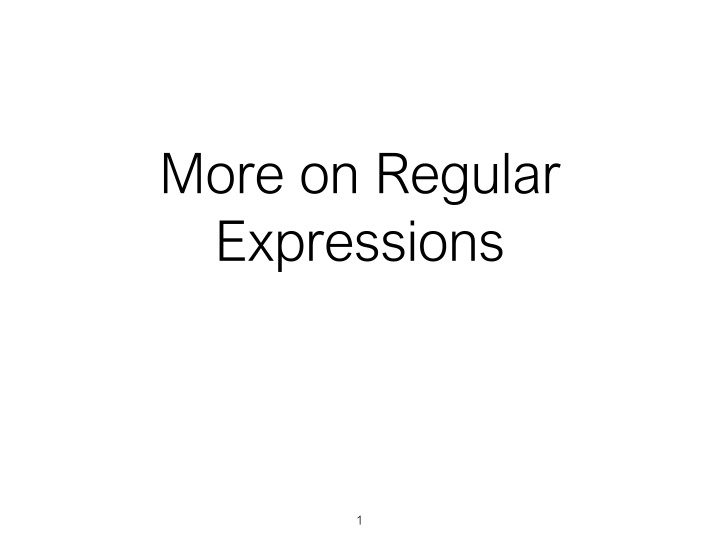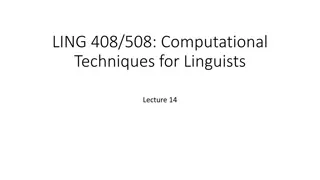
Advanced Regular Expressions Tips and Tricks
Discover advanced tips and tricks for working with regular expressions, including character classes, credit card verification, Luhn algorithm, and matching techniques like beginnings and endings. Enhance your regex skills with practical examples and explanations.
Download Presentation

Please find below an Image/Link to download the presentation.
The content on the website is provided AS IS for your information and personal use only. It may not be sold, licensed, or shared on other websites without obtaining consent from the author. If you encounter any issues during the download, it is possible that the publisher has removed the file from their server.
You are allowed to download the files provided on this website for personal or commercial use, subject to the condition that they are used lawfully. All files are the property of their respective owners.
The content on the website is provided AS IS for your information and personal use only. It may not be sold, licensed, or shared on other websites without obtaining consent from the author.
E N D
Presentation Transcript
More on Regular Expressions 1
More character classes \s matches any whitespace character (space, tab, newline etc) \w matches a word character (letters, numbers, underscore) \b matches an empty string at the beginning or end of a word 2 107 - Regular Expressions
What would the match be? For the string 'The quick brown fox jumps over the lazy dog.' \w* \s\w* .*z.* \w*z\w* 3 107 - Regular Expressions
Verifying a credit card How do we check for a number such as 1234 5678 9012 3457? Start with \b\d{4}[ -]\d{4}[ -]\d{4}[ -]\d{4}\b We can group the 3 repeating patterns to \b(\d{4}[ -]){3}\d{4}\b 4 107 - Regular Expressions
Extracting # The regex will accept any 16 digit number which has 4 groups # of 4 digits. # Each of the groups is separated by a space or a dash '-'. # There can be text before or after the card number. card = 'my card number is 1234 5678 9012 3452 don\'t tell anyone.' pattern = r'\b(\d{4}[ -]){3}\d{4}\b' match = re.search(pattern, card) if match: print(match.group(), '- ', end='') number = match.group().replace(' ','') luhn(number) 5 107 - Regular Expressions
Luhn Algorithm def add_digits(string): '''Converts the chars of string into ints and adds them. string must only consist of digits ''' return sum([int(c) for c in string]) def luhn(string): '''Print a result determined by the string and Luhn algorithm. 'possible' if string is ok 'invalid' if string is not. ''' total = 0 odd = False for c in reversed(string): if odd: n = int(c) * 2 total += add_digits(str(n)) else: total += int(c) odd = not odd print('possible' if total % 10 == 0 else 'invalid') 6 107 - Regular Expressions
Beginnings and Endings I mentioned last time that there are two methods you can use when comparing regexes with a string, the match and search methods. search finds matches anywhere in the string. match finds matches only at the beginning of the string. You can also find matches at the beginning or end of lines. A string can run over several lines if re.MULTILINE is used. ^ matches the beginning of a string (or line if multiline). $ matches the end of a string (or line if multiline). 7 107 - Regular Expressions
findall search returns one match (the first one) in a string findall returns a list of all the matches Given the string 'k.shan@auckland.ac.nz, pbsord@lm.se, lme@123-4.com, one_two@three.four.com' and the pattern [\w.]+@[\w.]+ (special characters, in this case . , lose their special meaning inside square brackets) re.findall(pattern, string) returns ['k.shan@auckland.ac.nz', 'pbsord@lm.se', 'lme@123', 'one_two@three.four.com'] 8 107 - Regular Expressions
findall and files When combined with reading data from files findall is particularly powerful. e.g. to find all of the tags in a web page you could do file = open('index.html') result = re.findall(r'<.*>', file.read()) This may not give the result you expected because the star operator is greedy. Use <.*?> to get the smallest match. 9 107 - Regular Expressions
Replacement Just as you can replace any part of a string with the replace method you can do the same with regular expression matches and the sub method. >>> s = "Replace all of my vowels with underscores." >>> re.sub(r'[aeiou]', '_', s) 'R_pl_c_ _ll _f my v_w_ls w_th _nd_rsc_r_s.' 10 107 - Regular Expressions











